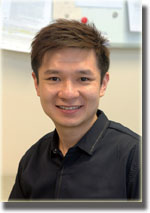Teaching Philosophy
I am truly honored to be the recipient of the SCGE Exemplary Teaching Award in General Education and indebted to the Senate Committee for the recognition of my effort.
Chemistry may be a difficult subject to students simply because we cannot visualize atoms or molecules by naked eyes and definitely cannot appreciate chemical reactions which shape the environment around us. Put aside the abstract concepts, you will find the beauty of Chemistry and that everything is related to Chemistry. For example, pharmaceutical chemists help develop new drugs and ensure quality control of drug manufacturing. Agricultural chemists are involved in developing improved crop strains or novel pesticides, herbicides or fungicides. Environmental chemists work hard to perform chemical analysis of water, air or biological sample to identify contaminants.

Curriculum Design
UGEB2380 Chemistry of Life and UGEB2410 Chemistry in Action are two general education courses offered by the Department of Chemistry which aim at arousing students' interest in Chemistry, extending curiosity and explaining phenomenon related to life experience using simple principles. The curriculum is carefully designed for students with diverse background. In order to keep more-able students in the class, recent scientific research is included in the curriculum so that they will not get bored for topics they have already learnt in high school.
Teaching and Learning Activities
Video Clips from the Internet
Chemistry is an experimental science. Due to safety issues, it is unlikely to arrange experiment classes. Nevertheless, I make use of online resources to demonstrate experiments. Interested students can even try them at home.
(i) When I taught Acid-Base Chemistry, I showed a short video to demonstrate the invisible ink, followed by a detailed explanation of the principle behind. Another video showed a raw egg soaked in a glass of vinegar. The acid dissolved the hard calcium carbonate egg shell, leaving a bouncing "elastic egg".
(ii) DNA exists in all life and is very important for storing biological information. It is intuitive that we cannot see DNA molecule because they are too small. What surprises students is that DNA can be seen by naked eyes by a simple experiment which extracts DNA from broccoli with simple tools and chemicals such as ethanol, detergent, paper filter and a hand blender.

Other videos can reinforce students' understanding on the topics. When I talked about Radioactivity, I mentioned that nuclear energy was a green energy. However, if handled improperly, it could lead to disaster. Chernobyl and Fukushima Daiichi nuclear disasters are the two events classified as a level 7 disaster in history. At this point, students could hardly imagine the danger of radiation exposure. I showed a video on the Chernobyl disaster outbreak showing people with severely deformed limbs and the deserted 30 years after the outbreak. The class became very quiet after the video and I believed that students received the message.
Games
Class activities can brighten the lectures. Students were asked to form groups to assemble simple molecules from balls and sticks, just like playing Lego. There was another game about message encoding and decoding. This game was highly related to the DNA in biological systems.
Scientific Research and Newspaper Cutting
My courses aim at bringing Science into daily life. I included a lot of newspaper articles and recent scientific research to demonstrate a strong connection between course contents and everyday life experience. Recent researches brought to students' attention included: i) New way to degrade plastic by a fungus; ii) Ways of cooking rice to increase digestion resistant enzyme so to cut the degree of calories absorption; iii) using centrifuge spinning to unboil an egg with potential application in pharmaceutical industry.
Science is not an ivory tower. It is an approach to the world, a critical way to understand, explore and engage with the world, and then have the capacity to change the world. Finally, I want to take this opportunity to thank Professor Yeung Ying Yeung for nominating me for this award, my colleagues in the Department of Chemistry and my family, especially my wife, for the caring and support.

|










